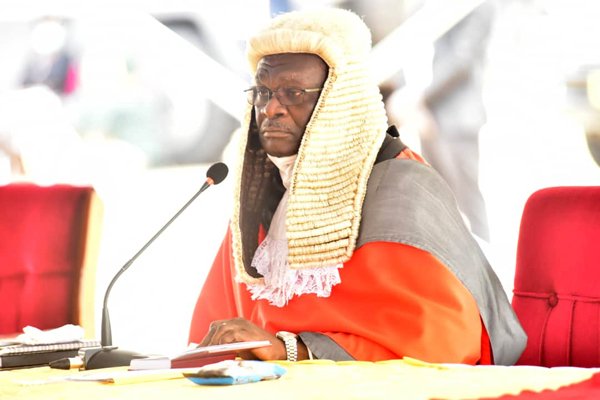Supreme court suspends decision not to prosecute civilians in Army Court
Thursday July 15 2021

Chief Justice, Alfonse Owiny-Dollo
An interim order suspending the implementation of the Constitutional Court decision that barred the Army Court from Prosecuting Civilians has been granted by the Supreme Court.
A panel of five Justices led by Chief Justice Alfonse Owiny Dollo said that the temporary order will run up to 29th July 2021 to allow the Justices to study Government's case for the intended appeal and make an appropriate decision.
On 6th July 2021 the Attorney General, Kiryowa Kiwanuka filed an appeal in the Supreme Court challenging the 1st July 2021 Constitutional court ruling which barred the General Court-martial in Makindye from trying Civilians.
According to a memorandum of appeal, the Attorney General faults the 4 Constitutional court Justices for deciding that the Army Court is not only impartial but also not independent to even try military personnel for non-service offenses.
The Constitutional court also trimmed the Army Court powers currently under the leadership of Lt Gen. Àndrew Gutti to only discipline errant UPDF personnel and not to try civilians who have not voluntarily subjected themselves to military law.
The court also declared as unconstitutional section 119 (2) of the UPDF Act which has been subjecting Civilians to military law and further ordered that all civilians currently serving sentences imposed by the court-martial or have pending cases should have their case files reviewed by the High Court's Criminal Division within 14 days; something the Attorney General further challenges.
The Constitutional court majority decision of 4 - 5 Justices was prompted by a 2016 petition filed by former Nakawa East MP Micheal Kabaziguruka and 45 other people against the Attorney General of Uganda.
In the Petition, Kabaziguruka and co-petitioners challenged their treason trial instigated at the General court-martial by the UPDF on grounds that they are civilians who cannot be charged with military offenses.
The 4 Justices led by Kenneth Kakuru allowed their petition and concurred with the group that indeed the Army Court is a tribunal established by the executive arm of government to enforce military discipline in the UPDF.
The Justices further ruled that the court-martial whose composition and appointment of members by the UPDF High command qualifies it as a specialized court to discipline errant UPDF officers.
However, the 5th Judge, Stephen Musota, dissented in his Judgement from his colleagues stating that the military court has jurisdiction over civilians. This is the same position Kiryowa Kiwanuka holds thus asking the Supreme court to overturn the lower court's decision.


